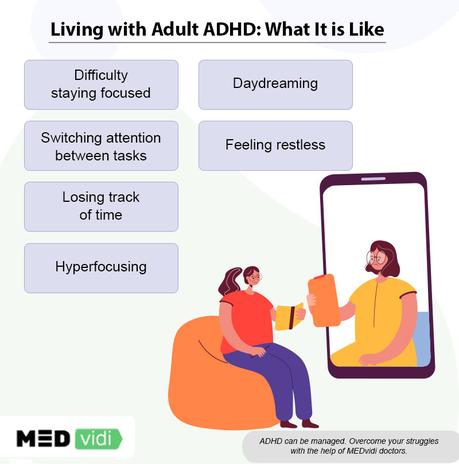What Does It Feel Like?
- 9 March, 23
 Written by
Rabia Khaliq, MSc
Written by
Rabia Khaliq, MSc in Applied Psychology
 Medically reviewed
Dr. Umar Javed, MBBS
March 2023
Content
Medically reviewed
Dr. Umar Javed, MBBS
March 2023
Content
 ADHD
Understanding ADHD in Adults: What Does It Feel Like?
ADHD
Understanding ADHD in Adults: What Does It Feel Like?
ADHD/ADD is not just a childhood problem — adults are also prone to it. Adults with ADHD may struggle with day-to-day activities, interpersonal issues, and job-related problems because of their symptoms. They may also endure chronic feelings of irritation, guilt, or self-blame. Additionally, those with ADHD may struggle with impaired executive function, working memory, and concentration.
When trying to understand ADHD, remember that its manifestation in each person is unique. However, there are also standardized diagnostic criteria and symptoms, which may help people get an idea of what living with adult ADHD looks like. In this article, we will try to aid you in understanding ADHD in adults by providing a typical illustration of this disorder. So, keep reading!
Do you suffer from ADHD symptoms? Seek medical attention and lead a happy life you deserve.
Contact A Doctor OnlineThe Specifics of ADHD in Adults
It is not uncommon for adults to suffer from ADHD, but the disorder is often left undiagnosed and therefore, untreated. In adulthood, symptoms may emerge differently than in childhood. For instance, hyperactivity may manifest as severe restlessness.
When the demands of maturity rise, symptoms may worsen. The root problem is in lack of awareness of ADHD signs in adults, which is why many patients remain undiagnosed and do not receive proper treatment. As per a 2020 study, 2 to 5% of the population may have ADHD, and it is up to 20% of those adults who have already sought medical help for mental health conditions.
While researchers are unsure of the precise reason for ADHD, they believe it is probably a result of genetics, environment, and subtle variations in how the brain is built. You probably still have some symptoms in adulthood if you were diagnosed with ADHD as a child. But even if you didn’t receive a diagnosis when you were a child, ADHD can still impact you as an adult.
What is It Like to Have ADHD?
The symptoms of attention deficit hyperactivity disorder go far beyond a lack of focus. The following concerns will be present in people with ADHD and impair or lower the level of social, academic, or occupational functioning:
- Trouble devoting enough time to tasks and completing them.
- Difficulty paying and maintaining attention.
- Exhibiting hyperactive behaviors like fidgeting or tapping and talking excessively.
- Daydreaming or tuning out.
- Organizational difficulties.
- Hyper-focus and tendency to lose track of time.
Nonetheless, there are a variety of consequences that might result from these ADHD symptoms. That could include:
- Frequent procrastination.
- Emotional rage.
- Problems in interpersonal interactions.
- Difficulties at work.
- Have trouble starting difficult tasks and activities.
- Difficulties setting priorities.
Get an accurate diagnosis of ADHD by discussing your symptoms with an ADHD expert.
Book An AppointmentHow Does a Person with ADHD Think?
Most adults with ADHD have always been aware of their unique way of thinking. They might notice that they do not fit the typical behavioral patterns. The ADHD brain is typically readily overloaded. People with ADHD have more intense, passionate experiences with life than neurotypicals. As a result of their constant exposure to their five senses and their thoughts, they have a low threshold for external sensory experiences. Life experiences overload the ADHD nervous system because it is so intense.
Another example could be that the hallmark of ADD is the inability to manage attention span to successfully finish one activity or cognitive process before moving on to another. This results in rash decisions and often a hyperkinetic way of living. Although they might be passionate and creative, they are sensitive to outside distractions.
A Description of ADHD for Someone Without It
It may be hard to picture what ADHD feels like to someone who doesn’t have it. The majority of individuals can misinterpret it as somewhat increased activity and inattention. Some individuals might not understand the dynamics of ADHD symptoms. How to explain ADHD to someone who doesn’t have it is provided below.
ADHD has three types. The symptoms of the predominantly inattentive type include trouble focusing and paying attention to small details. Adults with the disorder and the “inattentive” specifier frequently struggle with managing routine social interactions, such as attending events, making new friends, and resolving conflicts. As a result, they occasionally encounter social rejection.
Predominantly hyperactive ADHD is the other kind of disorder. Adult hyperactivity might take the form of excessive talking or intense agitation. A hyperactive person may appear to be constantly moving, even when it is improper or overly so.
In addition, there is a combined presentation. People with combined ADHD have several symptoms related to both of the above-mentioned types.
It’s essential to remember that ADHD is a complex disorder. While it lacks particular physical symptoms like those experienced with a medical disorder, a person can still detect differences in their lifestyle and attitude toward performing daily activities. Because of this, ADHD in adults can occasionally go undetected. It could be challenging to describe ADHD without coming across as a justification.
If you are experiencing ADHD symptoms, seek medical attention. Get in touch with an ADHD expert!

As a Final Note
Hopefully, you found this article helpful in understanding ADHD in adults. The difficulties of having ADHD can impact all aspects of a person’s life, but the disorder can be managed. With proper treatment and self-help activities, many people with ADHD live happy, successful lives.
However, if left untreated, ADHD can negatively affect your life. It may have an impact on relationships, employment, and academics. To decrease the consequences of the disease, treatment is crucial. Book an online appointment with a doctor today to get your symptoms checked.

Real help for ADHD.
Beat your symptoms with our expert advice.





- ADHD Diagnosis
- ADHD help
- Attention deficit hyperactivity disorder (ADHD)
- What is ADHD
